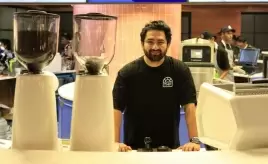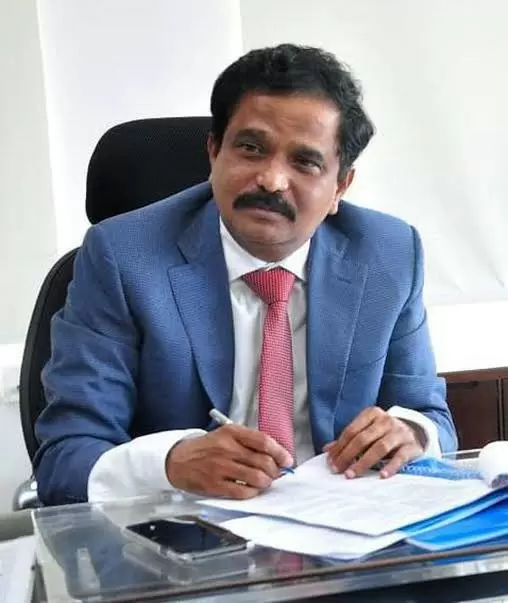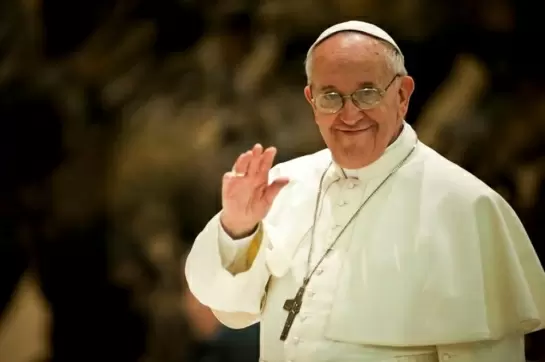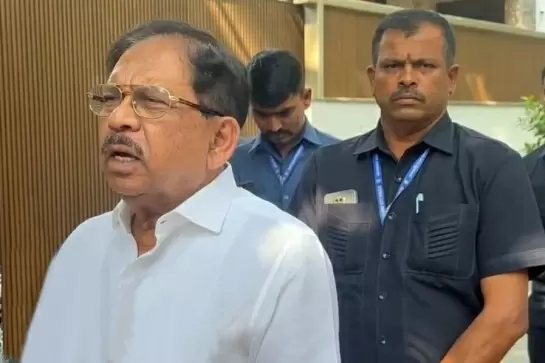‘Society needs concerned individuals, those with compassion and political orientation'

12-October-2013
Vol 4 | Issue 41
“Flames were coming from a human being; his body was slowly withering and shriveling up, his head blackening and charring. In the air was the smell of burning flesh . . . Behind me I could hear the sobbing of the Vietnamese who were now gathering. I was too shocked to cry, too confused to take notes or ask questions, too bewildered to even think.” – A journalist who witnessed a self-immolation.
Often, the term suicide is used synonymously with self-immolation. While both involve the act of killing oneself intentionally, self-immolation for a political cause is not just suicide, it is supreme act of defiance against the iron hand of authority. It is a scream intended to jolt the public conscience.
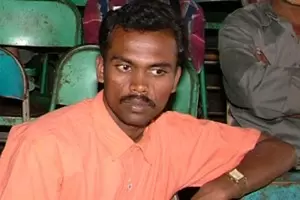 |
|
Muthukumar’s death sparked a wave of self-immolations in Tamil Nadu (Photos: Media Ramu)
|
On January 29, 2009, a 26-year-old youngster from Chennai, Muthukumar burnt himself opposing the genocide in Sri Lanka and the connivance of the Indian state.
His long letter addressed to the working class people took a dig at all those who kept silent while the mass killing was being orchestrated. Many took to the streets after his death. But the then state government was tactful in closing down the gates of colleges preventing the students from taking forward the struggle.
Following Muthukumar, 17 other youth from Tamil Nadu have burnt themselves for the same cause.
On August 28, 2011, a 20-year-old girl, Sengodi burnt herself demanding to stop the execution of Murugan, Santhan and Perarivalan. On September 26, activist Neelaventhan burnt himself demanding 6 percent internal reservation for the Arunthathiyar community from the Dalit quota.
The history of self-immolation in modern Tamil Nadu starts from the ‘anti-Hindi imposition’ agitation days in mid 1960s. Starting from Kizhappavur Chinnasamy, seven people burnt themselves protesting against the might of the Indian state which tried to force upon us the language of Hindi.
It was the second series of such acts in modern history. Two years earlier, in 1963, Vietnamese Buddhist monks had immolated themselves against an authoritarian regime.
The list is long. In the neighboring state of Andhra Pradesh, estimates suggest that more than 800 youngsters, students, professionals and political activists have committed the act for the formation of Telengana.
Over 100 Tibetian Buddhist monks and nuns have committed the act against the Chinese occupation of their land.
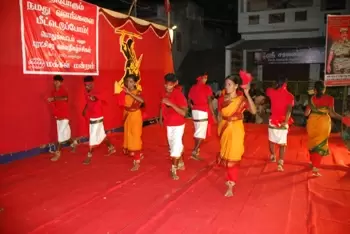 |
|
Sengodi, a member of Makkal Manram, a cultural troupe with political causes, in action
|
The famous Arab spring, which toppled many an authoritarian government, took its spark from the charred flesh of Mohammed Bouazizi. He was a Tunisian street vendor. Unable to survive in the face of huge economic crisis, corruption and clampdown on free speech, he burnt himself shouting “How do you expect me to make a living?”
In Algeria, a 26-year-old, Mohamed Aouichia, committed the act for want of basic housing. It triggered a wave of self-immolations in the country.
In early 2013, there was a similar wave in Bulgaria against high electricity bills.
The wave of self-immolations has been on the ascent for the last two decades. Few sporadic incidents in the past have become a trend now. A rather rational enquiry into it, than an emotional idolization is the need of the hour.
Need for Introspection
Glorifying self-immolations and idolizing the deceased does not lead to any solution.
Primarily, it is an indifferent State that forces one to take such drastic measures. The flame that burns and chars the flesh, the bone and the whole body does not seek any form of celebration. The flame is born out of hopelessness in front of an authority which would not listen to the voices of the people.
The flame is born from the bland and ineffective strategies political movements are used to. The flame is born from the numb psyche of the public.
When change does not seem to be near, when our strategies does not offer hope, when our protests have become sterile rituals, when one finds no way to voice his opinion, when the larger public chooses to be comatose, the mind of the oppressed, the anger of a helpless common man, the desperation of a compassionate human being chooses to suffer, to die, to go up in flames and end up as ash.
Treasured lives
Miracles seldom happen in history. Freedom is won after decades and centuries of struggle. Monarchy was not overthrown in a day. Freedom from slavery was not granted overnight. Eight hours work per day did not happen in a jiffy.
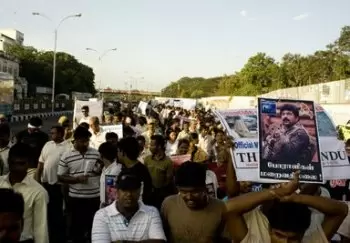 |
|
Save Tamils Movement activists taking out a protest rally in Chennai
|
Every right was won after relentless and persistent pressure. Political workers who took the job of changing the unequal social structure as their lifetime work, who traversed mountains and villages and across seas carrying the messages of political wisdom were the ones who changed the world.
It is a long, long road. To achieve our causes we need the concerned individuals, those with compassion and political orientation, who are willing to even die for a cause.
If only they could hold their breath for a moment, and contemplate, and continue their struggle in a more consistent and political way. If only they preserve their lives for a more meaningful work. If only they believe in the future than the flare. If only. If only.
Let’s not concede to a moment's inspiration. Let’s live, propagate, act, struggle, fight and change the world.
"Men are mortal. So are ideas. An idea needs propagation as much as a plant needs watering. Otherwise both will wither and die." - Marx.
The Author is a Working Committee Member of Save Tamils Movement (STM). STM is an independent political movement comprising IT professionals and youth that campaigns for the political, democratic and human rights of the oppressed people of Tamil Nadu. The movement was formed in November 2008 in the backdrop of Sri Lanka’s Genocidal war against Eezham Tamils.
This Article is part of 'Stop Self-Immolations' - A TWL Campaign
Other Articles in the Series
The campaign against self-immolations has its impact with more voicing support
‘A true fighter stays the course and fights till his last breath’


